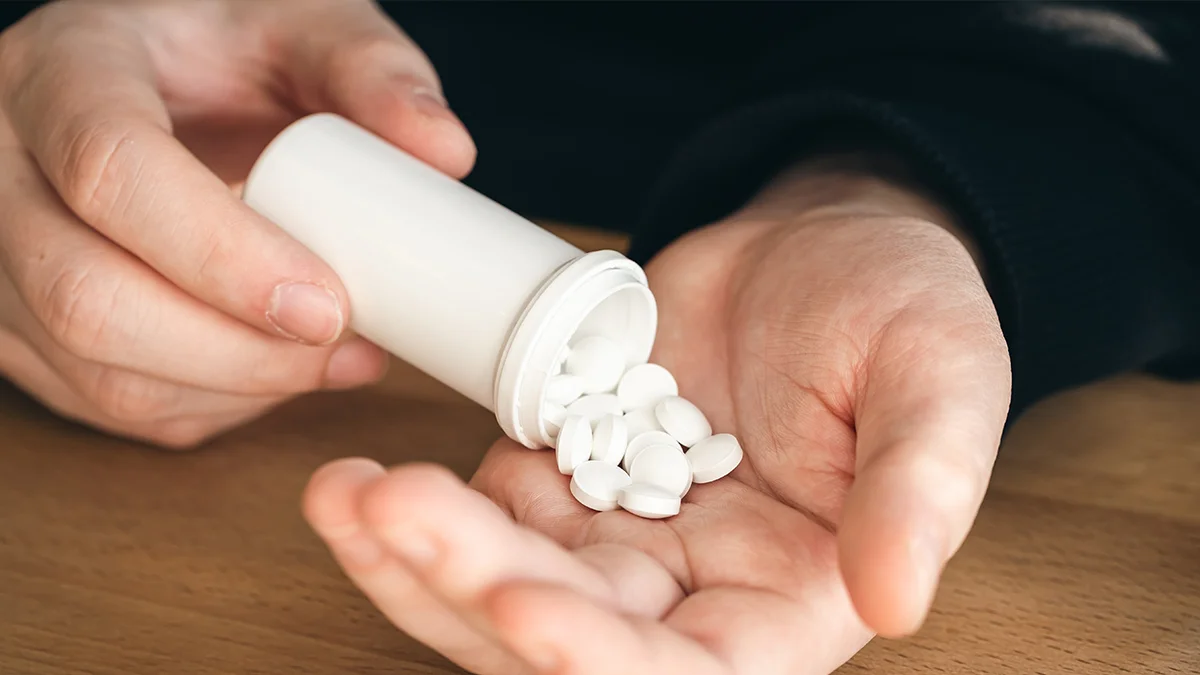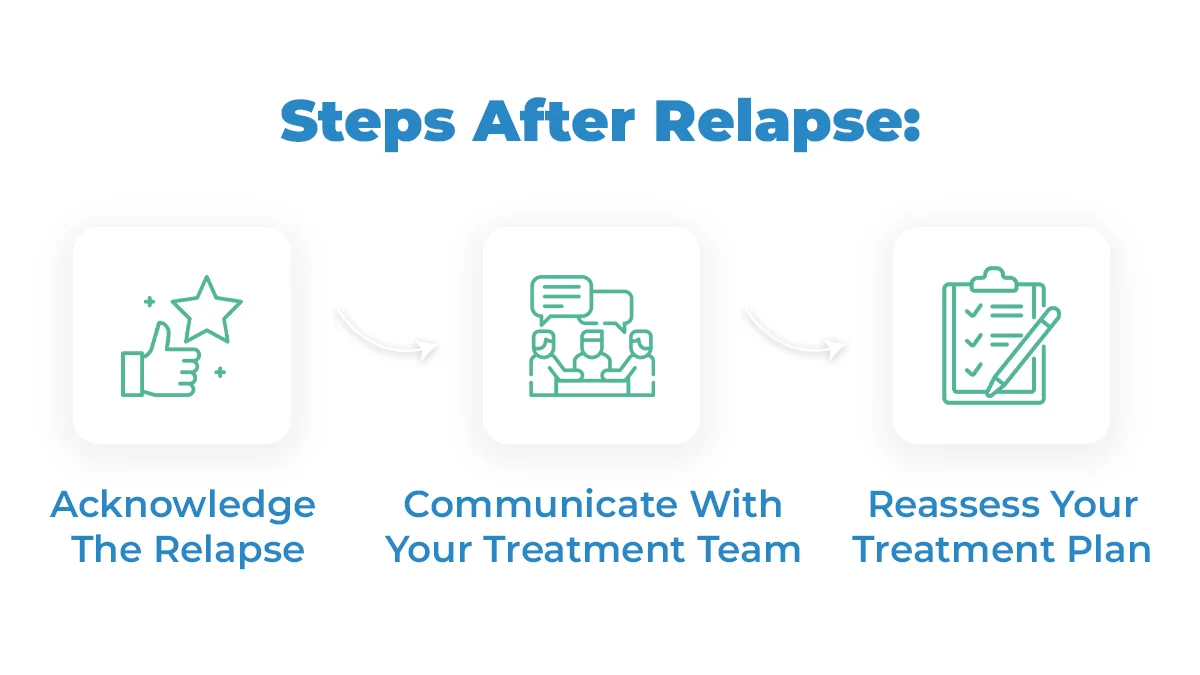
Using Tramadol To Manage Suboxone Withdrawal
Explore the role of tramadol in managing suboxone withdrawal symptoms with The Recovery Team-Newton.

Relapsing during an intensive outpatient program (IOP) is a significant challenge in the journey to recovery from addiction. This setback can evoke guilt, shame, and frustration, potentially undermining confidence and progress.
IOPs are structured to provide support, education, and strategies for managing such setbacks. By addressing relapse openly within the therapeutic framework, individuals can develop resilience, refine their coping mechanisms, and renew their commitment to long-term sobriety.
Relapses are common during recovery, and experiencing one doesn’t mean failure. Here’s what you need to know:
Our dedicated team offers compassionate support and guidance. For expert assistance on your journey to sobriety, contact The Recovery Team-Newton at (508) 978-2772.
In intensive outpatient programs (IOP), relapse poses a significant challenge. Despite structured support, individuals may succumb to triggers or old habits, leading to setbacks in their recovery journey. Relapse often stems from underlying issues such as stress, unresolved emotions, or social pressures. It highlights the complexity of addiction and underscores the importance of ongoing therapy and coping strategies.
Experiencing a relapse can be tough, but it’s important to take immediate action. Here are three key steps to get back on track.
The first step is to acknowledge that a relapse has occurred. It’s crucial to face reality without shame or denial. Accepting the relapse helps you take control of the situation. Understand that a relapse doesn’t mean failure; it’s a sign that your strategy needs adjustment. Be honest about what led to the relapse, as this self-awareness is vital for your recovery.
Next, reach out to your treatment team. These professionals are there to support you. Informing them about the relapse allows them to provide the necessary assistance. They can offer advice, modify your treatment plan, and give you the encouragement you need.
Don’t hesitate to be open about what happened and how you feel. This communication will ensure you don’t face the challenge alone and get needed support.
After a relapse, it’s important to look at your treatment plan again. What triggered the relapse? What can you do differently? Work with your treatment team to identify areas that need change. Maybe you need to adjust your therapy sessions or add new coping strategies. Reassessing your plan helps you strengthen it, making it more effective. This proactive approach can prevent future relapses and support your continued recovery.
Relapse can significantly affect the treatment of the IOP. When someone relapses, they may lose some of the progress they made during treatment. This can lead to setbacks in their recovery journey.
This also means the treatment plan might need to change to address new or returning issues. Relapse can make it harder to regain trust with therapists and support groups and may lead to feelings of guilt or shame. However, it’s important to remember that relapse is a common part of recovery and can be an opportunity to learn and grow.
Relapse can have a strong emotional and psychological impact. It often brings feelings of failure, disappointment, and frustration. People may feel like they let themselves and their loved ones down. This can lead to increased anxiety, depression, and a sense of hopelessness.
The emotional toll can be heavy, making it harder to stay motivated in treatment. Emotional support and encouragement help individuals navigate these tough feelings and stay committed to recovery.
When a relapse occurs, the treatment plan may need to be adjusted. This could involve increasing the intensity of therapy sessions or adding new types of therapy. For example, a person might benefit from more one-on-one counseling or group therapy.
Treatment adjustments also include reassessing goals and creating new strategies to cope with triggers and cravings. The treatment can better meet the person’s current needs and help prevent future relapses by making these changes.
Relapse can slow progress, but it doesn’t erase all the hard work done so far. It can be a stumbling block, but many people continue to move forward after a relapse. With the right support and treatment adjustments, individuals can regain their footing and even learn more about themselves and their addiction.
Relapse is not the end of the journey; it’s just a detour that can lead to greater understanding and strength in the long run.
Relapse can happen, but knowing how to get back on track is important. One effective strategy is to identify and avoid triggers, which are situations, places, or people that might tempt you to fall back into old habits.
Another strategy is to set small, achievable goals. Celebrate each milestone to stay motivated. Lastly, stay positive and remind yourself why you started your journey. Believe in your ability to overcome setbacks.
Coping mechanisms help us deal with stress and challenges. It’s useful to review these regularly. What worked in the past might not work now, and that’s okay. Try new coping methods, like deep breathing, meditation, or exercise.
Talk to a friend or counselor if you’re feeling overwhelmed. Keep a journal to track your feelings and progress. This helps you understand what works best for you.
A strong support system is crucial for success. Surround yourself with people who encourage and support you. This could be family, friends, or support groups. Don’t hesitate to ask for help when you need it. Regularly check in with your support network to keep connections strong. Share your goals and progress with them. Their encouragement can be a powerful motivator.
Exploring new therapeutic techniques can be beneficial. Cognitive-behavioral therapy (CBT) helps change negative thought patterns. Mindfulness therapy teaches you to stay present and reduce stress. Art therapy allows you to express emotions creatively.
Try different techniques to see what resonates with you. It’s okay to combine several methods for the best results. Always stay open to learning and adapting new ways to improve your mental health.
The IOP team plays a crucial role in addressing relapse. They provide support and guidance to individuals who are struggling. The team includes therapists, counselors, and other professionals who work together to create a safe environment.
Therapists and counselors are essential in providing support during recovery. They offer a listening ear and professional advice. Through one-on-one sessions, they help clients explore their feelings and challenges. They teach important skills like stress management and healthy coping mechanisms.
Counselors also help set realistic goals and track progress. They encourage and help build confidence. Their support is consistent and tailored to each individual’s needs, significantly impacting recovery. Therapists and counselors are always there to guide clients through difficult times.
Group therapy is a key component of the IOP. It brings people who are facing similar challenges together, creating a sense of community and shared understanding. In group therapy, members can share their experiences and support each other.
The dynamic allows individuals to learn from others’ successes and setbacks, fostering a sense of accountability and motivation. Group therapy sessions are led by trained professionals who guide discussions and ensure a safe, respectful environment. The interactions within the group help build social skills and provide different perspectives on handling problems.
Individual therapy in IOP is flexible and adjusts to meet the client’s needs. Therapists may change their approaches based on what works best for the individual. They might introduce new techniques or focus on different issues as the therapy progresses.
This personalized approach ensures that therapy remains effective and relevant. Regular assessments help identify what adjustments are needed. This way, therapists can provide the most beneficial support, helping clients make steady progress in their recovery journey. Individual therapy adjustments are key to a successful and tailored recovery plan.
Preventing future relapses in an IOP involves a combination of individual effort, support from professionals, and a strong support network.
Here are some strategies:
Preventing relapse begins with recognizing high-risk situations. Identify triggers that can lead to cravings or temptations. These might include specific places, people, or emotions like stress, loneliness, or anger. Stay alert to situations where you’ve previously used substances. Make a list of these triggers and discuss them with your therapist or support group. Knowing what to avoid can help you stay on track and maintain your progress.
Create a solid relapse prevention plan to keep yourself on the right path. Start by setting clear, achievable goals for your recovery journey. Include strategies to handle stress, such as exercising, practicing mindfulness, or engaging in hobbies you enjoy.
Develop a daily routine to provide structure and stability. Ensure you have a support network, whether family, friends or a support group. Regularly check in with your therapist to adjust the plan as needed. Having a well-thought-out plan gives you the tools to manage challenges effectively.
Aftercare programs are crucial for long-term success in recovery. After completing an intensive outpatient program (IOP), join an aftercare program to receive continuous support and guidance. These programs offer group therapy sessions, individual counseling, and access to resources that promote sobriety.
Stay connected with others who understand your journey and can offer encouragement. Attend meetings regularly to keep your commitment strong. Aftercare programs help reinforce the skills and strategies learned in IOP, providing a safety net that helps prevent relapse and supports lasting recovery.
The chances of relapsing after achieving sobriety can vary, but comprehensive care in a treatment facility significantly improves outcomes. Effective relapse prevention strategies are crucial and often taught during rehabilitation.
Outpatient treatment provides continued support, helping individuals transition from intensive care to everyday life. By staying connected to treatment facilities and adhering to personalized relapse prevention plans, individuals increase their chances of maintaining long-term sobriety and successfully navigating potential triggers and challenges.
If I relapse during an IOP, my treatment program may change to include more intensive treatment options, additional support, and professional help. The treatment center might adjust the addiction treatment plan to address signs of substance abuse or alcohol use.
This can involve more frequent rehab sessions, addressing negative feelings, and involving family members. Long-term recovery from substance use disorders requires flexibility in the recovery process, ensuring a sober life and minimizing drug and alcohol use for a long time.
Relapse affects the brain by reinforcing addictive behaviors through the reward system, making it harder to resist future cravings. It disrupts neural pathways related to decision-making, impulse control, and stress regulation. Each relapse strengthens the association between the substance and pleasure, increasing dependence. This cycle can impair cognitive functions and emotional regulation and exacerbate mental health issues, making recovery progressively more challenging without comprehensive treatment and support.
Take back control of your life with The Recovery Team-Newton.
Our comprehensive approach combines day treatment and medication-assisted treatment to support your journey to sobriety. With evidence-based therapies, we equip you with the tools to manage relapse and regain control of your life. In addition, our experienced team provides personalized care and ongoing support, guiding you every step of the way towards a healthier, happier future.
Don’t let addiction hold you back any longer. Call us at (508) 978-2772 today to learn more and start your journey to recovery.

Explore the role of tramadol in managing suboxone withdrawal symptoms with The Recovery Team-Newton.

Explore the basics of insurance coverage for suboxone treatment in this guide from The Recovery Team-Newton.

Explore the effectiveness of medication-assisted treatment with The Recovery Team-Newton.